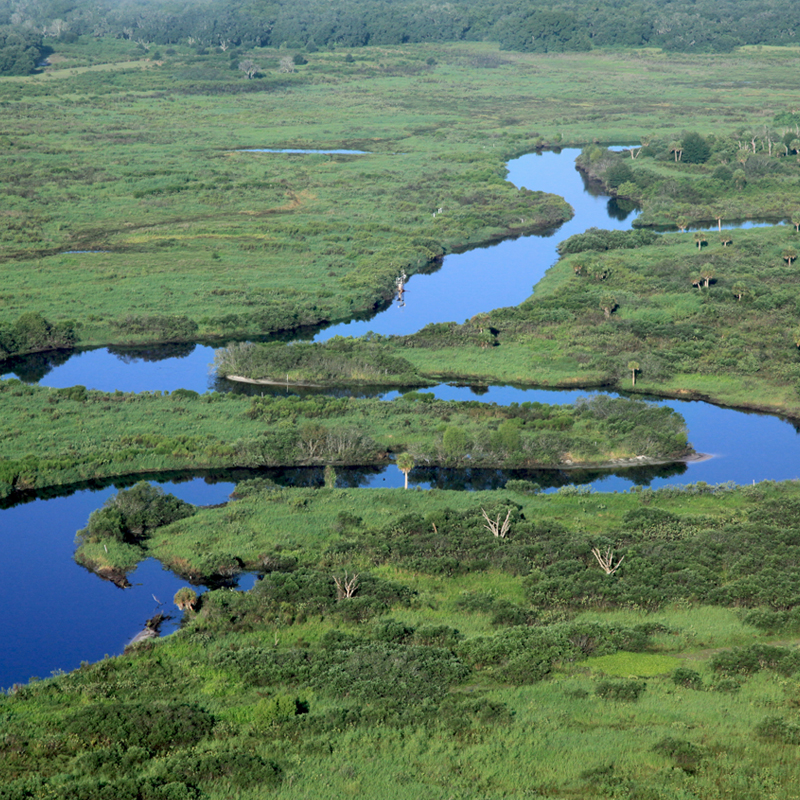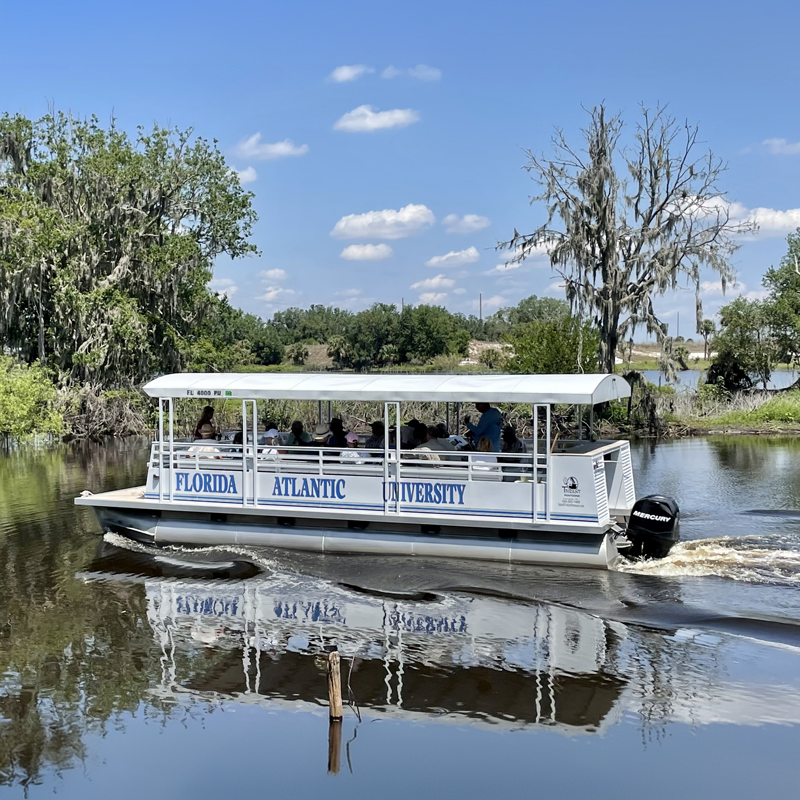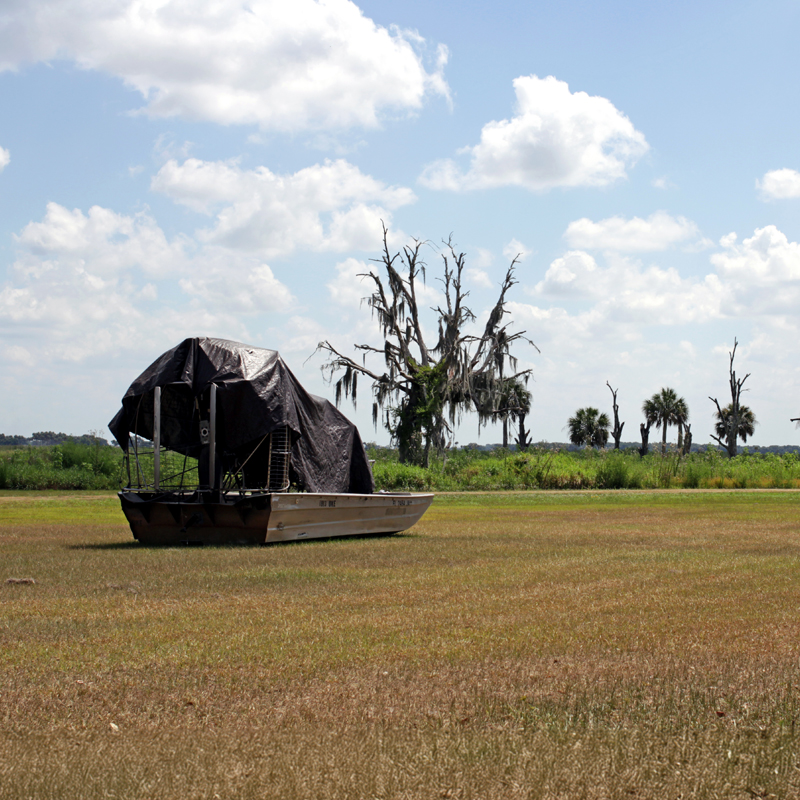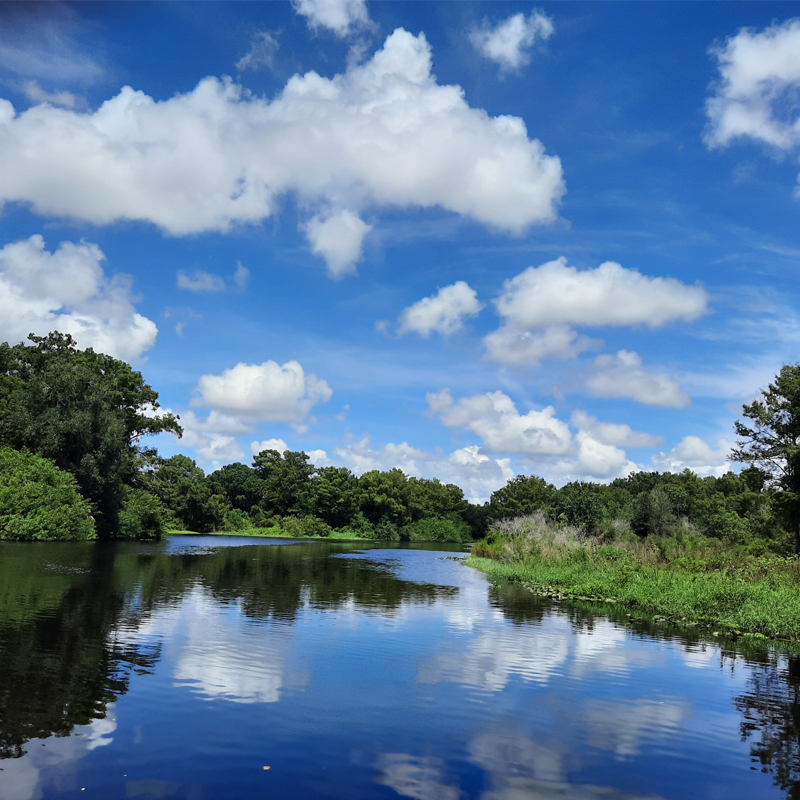How Science, Conservation, and Education Are Thriving at the Riverwoods Field Lab
Friday, Aug 23, 2024
You may not have heard of a small town called Lorida in Florida’s Heartland, but it has a big, international reputation. Lorida is home to the largest functioning river restoration undertaking in the world – the Kissimmee River Restoration project – and the Riverwoods Field Laboratory (Riverwoods).
Located in the Kissimmee River Basin, Riverwoods was established in 1995 to provide a physical base, as well as support for the extensive research and educational activities related to the restoration of the Kissimmee River – the mighty headwaters of the Everglades. Since then, Riverwoods has been managed by Florida Atlantic University’s Center for Environmental Studies (CES), within the Charles E. Schmidt College of Science, in partnership with the South Florida Water Management District (SFWMD).
Longtime Riverwoods employee and now Riverwoods Manager, alumna Amber Moore ‘13, works with fellow scientists to monitor the restoration of the Kissimmee River. For more than 18 years, she has served as a trusted steward and advocate for these critical wetlands.
“My favorite part of my job is the outreach,” shared Moore. “We get all kinds of visitors here. We have water managers who regularly visit from Holland, college students, and local kids who participate in FAU’s Pine Jog camps. Every one of them takes the knowledge they learned here back to their homes.”

Riverwoods proudly serves as a living laboratory for secondary and post-secondary students who participate in its Student Field Studies Program. Throughout the workshops, students have the unparalleled opportunity to explore the Kissimmee River at Riverwoods and participate in activities that enhance STEM (science, technology, engineering, and math) concepts. Ecology students from the Schmidt College of Science often spend several weeks at Riverwoods as part of their required coursework. Other institutions such as the University of Florida and Wake Forest University send students to Riverwoods for an alternative spring break to learn more about the area’s wading and migratory birds.
Residents and visitors are also encouraged to explore the Kissimmee River and take part in guided Eco Tours. Since 1998, CES has offered engaging and informative tours aboard a 30-foot covered pontoon boat, the Kissimmee Explorer II. Moore spearheads the tours and serves as boat captain herself.
“It is an excellent way to experience firsthand the successful restoration of the river,” she remarked.

The Kissimmee River restoration project, a cost-shared endeavor between the SFWMD and the U.S. Army Corps of Engineers (USACE), aimed to undo the devastating ecological damage from a 1960s USACE directive to build a network of canals and waterways to drain the meandering, 103-mile-long Kissimmee River’s floodplains. Restoration efforts began in 1992, and included backfilling over 20 miles of the C-38 canal (toward Lake Okeechobee) and removing two water control structures.
“Central Florida is a key piece of the puzzle,” stated Moore. “What happens here is going to affect what happens downstream. Being able to protect these wildlife corridors for future generations is crucial.”
After 22 years, the USACE completed all river restoration construction projects. CES and the SFWMD co-hosted a celebratory event at Riverwoods on July 29, 2021.
“Despite our small staff, we pride ourselves on the important work we’re doing and sharing how incredibly successful this restoration project has been,” shared Moore. “I feel like we’re reaching a lot of people, and I’m looking forward to continuing to spread our knowledge.”

Within a year following its completion, the natural flow to the historic river was restored. The project has reflooded tens of thousands of acres of wetlands and is quickly becoming an ecological haven once again for numerous wading birds, fish, and other wildlife. While the aquafer that supplies water to large parts of South Florida and beyond is being replenished, the Riverwoods and SFWMD teams are still working to revitalize the headwaters – the water storage in the Upper Chain of Lakes that feeds the Kissimmee-Okeechobee-Everglades system.
“That’s the hydrology piece that still needs to be finished,” explained Moore. “Now that the flood plain has been reestablished, the water is being filtered much better before it moves south. We have seen a very strong aquatic vegetation response and a much healthier ecosystem so far. While it is a significant improvement, it is hard to quantify the water quality just yet.”
Professionals from around the globe travel to Riverwoods to study the lessons learned from the flooding, channelization, and ultimately, the restoration of the river. Riverwoods regularly hosts research scientists, K-12 students, and technicians from local communities, across the state, the nation, as well as international countries, at its Visitors’ Center.
To learn more about the Riverwoods Field Laboratory, visit https://www.ces.fau.edu/riverwoods/ .